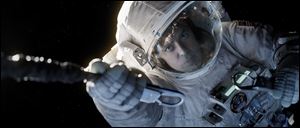
MOVIE REVIEW
There is no defying 'Gravity'
Film deals with dangers in space in intelligent, realistic manner
10/4/2013
This film image released by Warner Bros. Pictures shows George Clooney in a scene from "Gravity."
In the stunning and gorgeous space disaster Gravity, Alfonso Cuarón reminds us that not all cosmic dangers are warlord extra-terrestrials, acid-bleeding aliens, or Texas-sized asteroids.
The acclaimed filmmaker (Children of Men, Harry Potter and the Prisoner of Azakaban) finds plenty to unnerve us in the cold vacuum of low-orbit space and the nightmarish scenario of two astronauts stranded in the inky-black void.
Gravity stars Sandra Bullock as Ryan Stone, a medical engineer on her first shuttle mission, and George Clooney as Matt Kowalski, a veteran astronaut on his last NASA voyage.
Cuarón opens with a wondrous sequence a hundred-plus miles above Earth with the astronauts on a space walk to upgrade the Hubble Space Telescope. Kowalski is making jokes with Mission Control in Houston, Ryan is all business with the Hubble mission, while below them the big blue planet revolves across the screen.
Directed by Alfonso Cuaron.
Written by Jonas and Alfonso Cuaron.
A Warner Brothers release, playing at Cinemark Franklin Park, Fallen Timbers, and Levis Commons.
Rated PG-13 for intense perilous sequences, some disturbing images, and brief strong language.
Running time: 90 minutes.
Critic’s Rating ★★★★★
Cast: Sandra Bullock, George Clooney, the voice of Ed Harris
★★★★★ Outstanding; ★★★★ Very
Good; ★★★ Good; ★★ Fair; ★ Poor
The flawless sequence serves dual purposes for the director: acclimate us to zero-gravity orbit through magnificent effects that bring us closer to the story rather than distract us from it; and put us at ease, if only for a few precious minutes, before all hell breaks loose.
The chaos starts innocently as an update to the shuttle crew from Mission Control (voice of Ed Harris, in a nice touch to Apollo 13) that the Russians have blown up one of their satellites. Houston assures the astronauts that the satellite's destruction shouldn’t be a concern. Moments later, the calm certitude turns dire alert: Pieces of the shattered satellite have collided with other satellites and created a dangerous debris field hurtling toward them at blazing speeds.
But it’s a warning too late. Before the crew can return to the ship and relocate to safe orbit, the cloud of metal fragments careens through them, destroying the shuttle and leaving the orbiting astronauts alone and with the grim prospect of suffocating in space. Their only hope is to use Kowalski’s experimental jetpack to blast them toward the International Space Station miles away and launch an escape pod to Earth. And to add to the tension, they have only 90 minutes to accomplish this difficult task before the orbiting debris return.
More than a heroine in peril, Ryan is a quietly assembled character arc, a woman who shut down emotionally after the death of her young daughter years ago, but in the face of her own morality comes to cherish life. In the course of the film, Bullock is feisty, touching, strong, weak, desperate, and triumphant. The Blind Side may have won the actress accolades and an Oscar, but it’s in Gravity that she delivers her grandest, boldest performance yet.
Clooney is the calm voice of reassurance and never-ending hope. Dashing and clear-headed in crisis, Kowalski isn’t a stretch for Clooney, but he’s dependably excellent in the important role as the rock for Ryan -- and us -- to cling amid the turmoil.
Gravity is concerned with the science of details; for example, eschewing sound effects -- remember, sound cannot travel in the vacuum of space -- for the sake of realism.
The roar of booster rockets and high-pitched clang of metal collisions are never missed, however, with Steven Price’s score effectively heightening the drama and emotion of each scene. Price’s ominous warnings of the deadly debris field’s arrival is particularly potent, as the dark, metallic music drenches the film in dread and angst.
Like any good disaster film, Gravity is an exercise in Murphy’s Law for the astronauts and their survival. Cuarón and son Jonás Cuarón, who cowrote the screenplay with his father, concoct a litany of obstacles standing between the heroes and their Earthly salvation.
Cuarón maintains this nerve-racking edge throughout the film. He also wisely limits the emotional ordeal to 90 minutes, thereby avoiding an exercise in unending protagonist futility and subsequent audience aggravation and instead delivering a tautly paced thrill ride of setbacks and miracles.
More than a simple premise of survival in space, Gravity represents a return to literate science fiction in movies.
Even as big-budget space movies rule the box office with stories of fantasy more than science, there have been a few cinematic attempts to return to intelligent discussion about the cosmos and humanity’s baby steps into the universe. There was the brief fascination in 2000 with manned trips to Mars in the equally flawed Red Planet and Mission to Mars. More recently, Oscar-winning director Danny Boyle’s Sunshine in 2007 sent a team of astronauts to reignite the dying sun, and Duncan Jones’ Moon in 2008 dealt with the psychology of the lone human on a lunar mining station.
But not since Stanley Kubrick’s 1968 masterpiece 2001: A Space Odyssey has a mainstream film featured space exploration in such an evocative, heady, and realistic manner.
Gravity isn’t just a great film. But in an age when intelligent and science fiction are more often at odds in Hollywood, it looms as one of the great achievements in space films, in this or any other era.
Contact Kirk Baird at kbaird@theblade.com or 419-724-6734.